China has warned the United States that it ‘should stop whining about being a victim in global trade’ in its latest swipe at Donald Trump‘s tariffs, as the trade war between the two superpowers continues to escalate.
Washington has raised levies on goods from China to a staggering 145 per cent as part of Trump’s worldwide tariffs rollout in recent weeks, which he said aimed to stop the US being ‘ripped off’ by trading partners.
China responded by hiking levies on US goods to 125 per cent last week, and while the tit-for-tat tariff increases appears to have paused, the animosity between the two nations has shown no signs of letting up amid a blistering war of words.
‘The US is not getting ripped off by anybody,’ an editorial in state-run media outlet China Daily read last night. ‘The problem is the US has been living beyond its means for decades.
‘It consumes more than it produces. It has outsourced its manufacturing and borrowed money in order to have a higher standard of living than it’s entitled to based on its productivity.
‘Rather than being “cheated”, the US has been taking a free ride on the globalization train.’
The article concludes: ‘The US should stop whining about itself being a victim in global trade and put an end to its capricious and destructive behavior.
‘Instead, it should commit itself to working with its trading partners to establish a fair, free and WTO-centered multilateral trading system that is in line with the times.’
The condemnation of Trump’s raging tariffs war came amid reports that China’s economy has continued to surge this year, with gross domestic product (GDP) increasing by 5.4% in the first quarter of 2025.
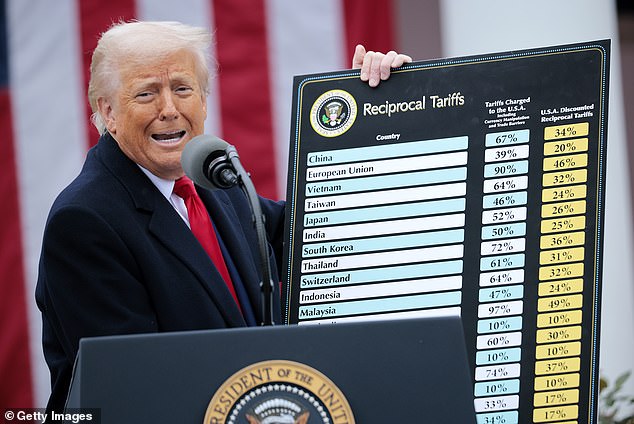
Washington has raised levies on goods from China to a staggering 145 per cent as part of Trump’s worldwide tariffs rollout in recent weeks
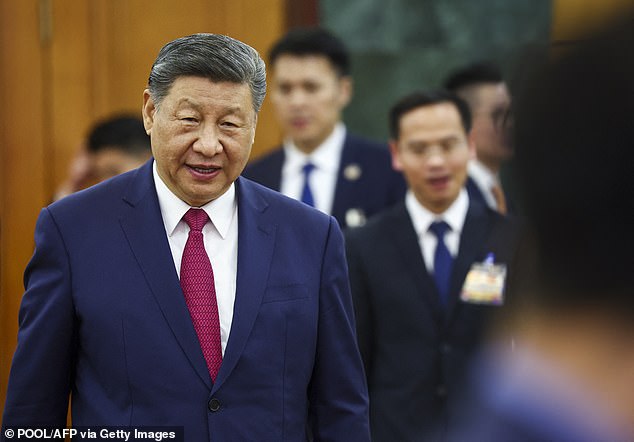
China’s President Xi Jinping arrives for a meeting with Vietnam’s National Assembly Chairman Tran Thanh Man in Hanoi on April 14
The war of words which has accompanied the tariff retaliations has seen a huge rift open up between the world’s two biggest economies, with each side launching brutal attacks on the other.
‘Let those peasants in the United States wail in front of 5,000 years of Chinese civilisation,’ a senior Beijing official declared this week.
The comment came after US Vice President JD Vance‘s drew condemnation earlier this month when he said that the US borrows and buys from ‘Chinese peasants’.
Despite fears of a hostile new administration in Washington and looming tariffs at the start of the year, the Chinese economy performed better than expected.
Data on showed China’s GDP grew 5.4%, unchanged from the fourth quarter but surpassing analysts’ expectations in a Reuters poll for a rise of 5.1%.
But growth momentum is expected to cool sharply in the next few quarters as Washington’s tariff shock hits Chinese exports, which account for a fifth of the country’s economy.
The White House said yesterday that Trump is open to making a trade deal with China, but added that it was up to Beijing to make the first move.
‘The ball is in China’s court: China needs to make a deal with us, we don’t have to make a deal with them,’ press secretary Karoline Leavitt told a press briefing, saying Trump had given her that statement directly in an Oval Office meeting to use.
‘China wants what we have… the American consumer, or to put another way, they need our money,’ Leavitt said.
Responding to the US comment on Wednesday, the Chinese foreign ministry said Washington should stop its practice of ‘maximum pressure’ and give up threats and blackmail if it truly wants dialogue and negotiation.
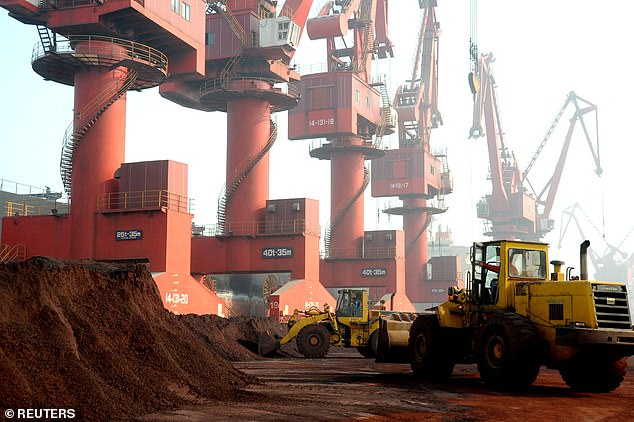
Shipments of seven rare earths from China have ground to halt, raising the risk of shortages as Chinese exporters begin the long, uncertain wait for government licenses. Pictured: File photo of workers transporting soil containing rare earth elements for export at a port in Lianyungang, Jiangsu province, China
‘This tariff war was initiated by the U.S. side… China does not want a fight, but it is not afraid of one either,’ ministry spokesperson Lin Jian told a regular press conference.
Trump has described Chinese President Xi Jinping in admiring terms, but neither man has backed down in an escalating trade war between their two countries.
‘The president, again, has made it quite clear that he’s open to a deal with China. But China needs to make a deal with the United States of America,’ Leavitt said.
Trump has said he expects something positive to come out of the trade tensions between the world’s two largest economies.
But, unlike multiple other nations who have responded to his plans for tariffs by seeking deals with Washington, Beijing has raised its own levies on US goods and not sought talks.
Meanwhile Hong Kong yesterday took the extraordinary step of suspending postal services to the US after being slapped with the 145% tariffs, despite not retaliating like mainland China.
In a shocking warning to residents in Hong Kong, officials accused America of being ‘unreasonable bullies’ who have ‘imposed tariffs abusively.’
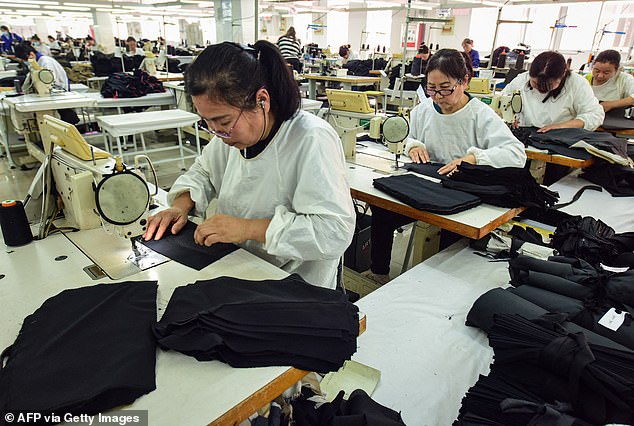
Employees produce garments that will be exported to France and Germany at a clothing factory in Lianyunggang, in eastern China’s Jiangsu province on April 8, 2025
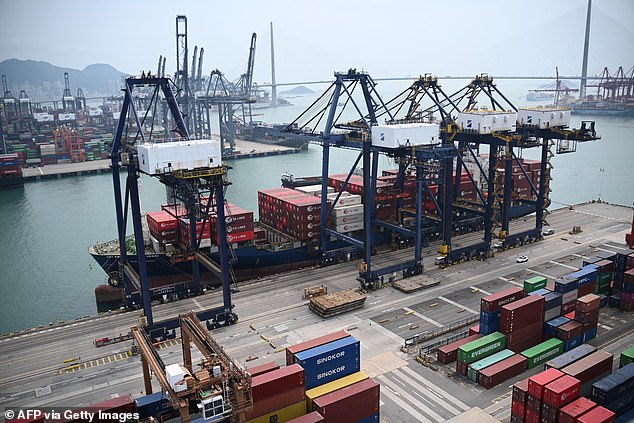
China hiked its levies on imports of US goods to 125 per cent, hitting back at Trump’s decision to single out the world’s No. 2 economy for effectively raising tariffs on Chinese goods to 145 per cent. Pictured: A container ship unloads its cargo at Kwai Chung Container terminal in Hong Kong on April 10, 2025
The semi-autonomous Chinese city, which has long been known as a free trading port which imposes limited levies on imports, previously had a special trade status with the US before Trump revoked this in 2020.
Officials said yesterday that Hongkong Post would no longer continue postal services to the United States via air mail from April 27, adding that residents looking to still deal with the US could expect to pay ‘exorbitant and unreasonable fees.’
The criticism of US policy has also spread to other areas, with the Chinese defence ministry warning today that ‘wanton’ use of force will not make America great again.
‘The sky-high defence budget exposed once again the bellicose nature of the U.S. side and its belief in ‘might makes right’,’ said Zhang Xiaogang, a Chinese defence ministry spokesperson.
His comments came following US accusations of Chinese aggression and reports of higher US defence spending in 2026.







